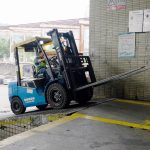In today’s logistics landscape, digitalization has become essential for keeping up with industry demands. For HGV drivers, digital tools aren’t just about efficiency; they’re about making work safer, more manageable, more sustainable, and more comfortable. But what’s possible with digital support, and how is it working in practice?
Addressing the Critical Driver Shortage with Digital Solutions
The logistics sector faces an escalating driver shortage crisis. The International Road Transport Union (IRU) reports a global shortage of over three million truck drivers, with shortages in Europe expected to triple by 2026, potentially leaving hundreds of thousands of positions unfilled. This shortage, driven by an aging workforce and a lack of new entrants, presents a critical need for solutions that make the job more attractive and manageable. Digital tools that simplify daily tasks, improve safety, and streamline operations are proving essential in drawing in new drivers and supporting the existing workforce.
Improving Driver Experience through Digitalization
HGV drivers today face complex tasks, including not only delivering goods and managing loading and unloading but also handling documentation and ensuring compliance with regulations on working hours, border crossings, tachographs, and electronic consignment notes. Digital solutions are simplifying these responsibilities with integrated cloud-based tools and mobile apps, making drivers’ daily tasks more manageable and less stressful.
Streamlining Toll Purchases Through Smart Telematics
Managing tolls across multiple countries is a significant part of long-haul transport, often requiring drivers to stop and purchase vignettes or toll passes. Girteka’s digital toll system allows drivers to purchase and validate tolls through mobile devices, reducing travel time by approximately 10 minutes per trip.
“For instance, our drivers can save up to 20-30 minutes when moving from Estonia to the Netherlands or the UK by purchasing necessary permissions and tolls through a mobile app. Across our fleet of 6,000 trucks, this results in substantial time savings that help us deliver goods faster and maintain a competitive edge,” comments Darius Olechnovič, Telematics Team Lead at Girteka.
Enhancing Parking Efficiency and Safety
Parking solutions have also improved with digitalization. Transport managers can pre-book secure parking for high-value cargo, ensuring both driver and cargo safety, which is automatically implemented in route planning and directions for drivers.
“We continually update information on parking spaces across Europe, organized by predefined safety categories. Currently, our database includes approximately 600 secure parking locations, easily accessible by drivers via GPS. The app also warns drivers when they approach ‘blacklisted’ parking areas, enabling them to avoid risks and safeguard cargo and assets,” adds Dainius Augutis, Transport Function Support Department Manager at Girteka.
Fuel Management Made Easy with Digital Payments
Fuel management has also evolved. Instead of relying on physical fuel cards, drivers at Girteka conduct approximately 60% of fuel transactions digitally, reducing risks related to lost cards or PINs. For drivers facing issues like a broken phone, an SOS support line allows them to access fuel codes, ensuring continuous service.
Document Management and Cargo Verification
Digital document management simplifies administrative tasks, allowing drivers to instantly capture and submit documents via mobile apps. A brief cargo status survey initiates the document submission process, ensuring all necessary paperwork is accurately recorded:
• Instant Processing: Once photos of documents are uploaded by drivers (today 99% of documents are processed this way), they’re processed automatically through robotic process automation and human support.
• Time Savings: This approach significantly reduces the time drivers spend on administrative tasks compared to handling physical paperwork.
• Customer Collaboration: The digital process creates a more efficient workflow with customers, improving coordination and saving time.
Contributing to Decarbonization Efforts through Eco-Driving Tools
With the logistics industry increasingly focused on reducing emissions, digital tools are playing a critical role in meeting sustainability goals. Girteka’s eco-driving features offer drivers real-time feedback on fuel consumption and efficiency tips, helping them adopt more eco-friendly driving habits. By focusing on eco-driving, Girteka has seen improvements in fuel efficiency across the fleet, contributing to a reduction of 2% of total fleet CO2 emissions.
Uladzislau Piatrychyts, a Girteka driver and recent ECO League challenge winner, shares, “The telematics system makes eco-driving simple. I can check my performance every day and make adjustments to improve fuel efficiency.”
Real-Life Impact: What Drivers Are Saying
Feedback from drivers across the industry has been positive. Many report that digital tools reduce stress and improve overall efficiency. Route optimization features have made it easier to manage time, leading to more predictable schedules and reduced fatigue.
“We’re seeing how digital tools make drivers feel more supported. Today, over 95% of our fleet utilizes the driver mobile app, allowing them to focus on driving safely and efficiently while minimizing errors,” summarizes Augutis.
Girteka’s adoption of digital tools aligns with a broader industry trend, where logistics companies are increasingly integrating digital solutions to support drivers and improve operational efficiency. However, Girteka stands out by combining telematics, mobile app functionalities, and sustainability-focused initiatives at scale, setting a benchmark for digital transformation in logistics.
similar news
The post Digital Tools Are Transforming the Role of HGV Drivers appeared first on Logistics Business.


